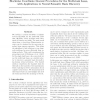Free Online Productivity Tools
i2Speak
i2Symbol
i2OCR
iTex2Img
iWeb2Print
iWeb2Shot
i2Type
iPdf2Split
iPdf2Merge
i2Bopomofo
i2Arabic
i2Style
i2Image
i2PDF
iLatex2Rtf
Sci2ools
ICML
2009
IEEE
2009
IEEE
Blockwise coordinate descent procedures for the multi-task lasso, with applications to neural semantic basis discovery
We develop a cyclical blockwise coordinate descent algorithm for the multi-task Lasso that efficiently solves problems with thousands of features and tasks. The main result shows that a closed-form Winsorization operator can be obtained for the sup-norm penalized least squares regression. This allows the algorithm to find solutions to very largescale problems far more efficiently than existing methods. This result complements the pioneering work of Friedman, et al. (2007) for the single-task Lasso. As a case study, we use the multi-task Lasso as a variable selector to discover a semantic basis for predicting human neural activation. The learned solution outperforms the standard basis for this task on the majority of test participants, while requiring far fewer assumptions about cognitive neuroscience. We demonstrate how this learned basis can yield insights into how the brain represents the meanings of words.
Coordinate Descent Algorithm | ICML 2009 | Machine Learning | Multi-task Lasso | Single-task Lasso |
| Added | 17 Nov 2009 |
| Updated | 17 Nov 2009 |
| Type | Conference |
| Year | 2009 |
| Where | ICML |
| Authors | Han Liu, Mark Palatucci, Jian Zhang |
Comments (0)

